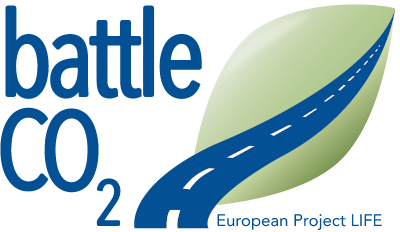LIFE BATTLE CO2
Europe LIFE ProjectProject Objectives
The Project LIFE BATTLE CO2 is focused on the technical, environmental and economic feasibility demonstration of biomass incorporation as alternative fuel in the asphalt mix manufacturing, typically linked to the use of fossil fuels.
The main objectives are:
New process manufacturing asphalt mixes
Establishing a manufacturing process for asphalt mixes operating 100% fossil fuel free. The use of diesel and fuel oil will be avoided in the thermal energetic processes in the plant (aggregates and bitumen heating), and electricity generation, usually obtained by diesel generators; will be obtained by the exploitation of the gases from biomass combustion. A new plant configuration will be developed, allowing manufacturing process to be “Fossil FuelFree” (triple F concept).
Environment
ReReduction of other contaminants associated to the fossil fuels combustion.
Carbon footprint improvement
Alternative processes design, as hot mix asphalt recycling including biomass, improving carbon footrpint in manufacturing, but also in the materials and transportation stages of the asphalt mix life cycle.
Environmental Declaration
Protocol development for generating the “Product Category Rules” (PCRs) for a new Environmental Product Declaration (EPD) related to Asphalt Mixes. Currently, there is no option for EPD in asphalt mixes. This declaration, according to the ISO 14025, allows the communication of environmental results. This will contribute to the promotion of environmental competition between companies in order to obtain the best environmental results of the market.
Reduction of GHG emissions
Reduction of the GHG emissions in the asphalt mix manufacturing stage. Biomass neutral emissions will be incorporated into the processes, stimulating the improvement of the carbon footprint value of the manufacturing process, as well as the whole life cycle of the asphalt mix product.
Validation
Demonstration and validation of the mechanical properties of the products developed under this scheme of manufacturing.
Process efficiency improvement
Process efficiency improvement, obtaining versatile installations and facilities, working with biomass as fuel, allowing new manufacturing approaches focussed on the current needs of the road sector. Large installations designed for new infrastructure manufacturing are oversized and are no longer cost-effective, because the efforts now are focused on conservation and maintenance operations of the already built infrastructures.
Demonstrator
Demonstration phase, using the products obtained with the new techniques in new infrastructure and in maintenance operations, in collaboration with Public Authorities.
